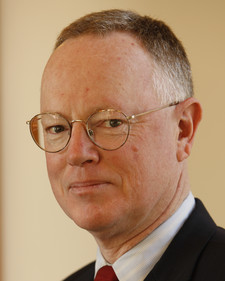

Paul Stephan
John C. Jeffries, Jr. Distinguished Professor of Law; John V. Ray Research Professor of Law; Director, Graduate Studies Program, Virginia Law
Paul B. Stephan is an expert on international business, international dispute resolution and comparative law, with an emphasis on Soviet and post-Soviet legal systems. In addition to writing prolifically in these fields, Stephan has advised governments and international organizations, taken part in cases in the Supreme Court of the United States, the federal courts, and various foreign judicial and arbitral proceedings, and lectured to professionals and scholarly groups around the world on issues raised by the globalization of the world economy. During 2006-07, he served as counselor on international law in the U.S. Department of State. He currently is a coordinating reporter for the American Law Institute's Restatement (Fourth) of the Foreign Relations Law of the United States. Other interests for Stephan, who joined the University of Virginia's law faculty in 1979, include taxation and constitutional law.
Stephan received his B.A. and M.A. from Yale University in 1973 and 1974, respectively, and his J.D. from the University of Virginia in 1977. In law school he was executive editor of the Virginia Law Review and a member of the Order of the Coif. Before returning to Virginia, he clerked for Judge Levin Campbell of the U.S. Court of Appeals for the First Circuit and for U.S. Supreme Court Justice Lewis F. Powell Jr. He has taught as a visiting professor at the Moscow State Institute for International Relations, the University of Vienna, Münster University, Lausanne University, Melbourne University, University of Pantheon-Assas (Paris II), Sciences Po, the Interdisciplinary Centre Herzliya, Sydney University and the Peking University School of Transnational Law in Shenzhen, China. He also has visited at Columbia Law School and Duke Law School.
After the collapse of the Soviet Union, Stephan took part in a variety of projects involving law reform in former socialist states. He worked in Russia, Georgia, Ukraine, Albania and Slovakia on behalf of the U.S. Treasury and in Kazakhstan and Azerbaijan on behalf of the International Monetary Fund. He also organized training programs for tax administrators and judges from all of the formerly socialist countries under the auspices of the Organization for Economic Cooperation and Development. His casebook on international business is used at law schools both in the United States and abroad. He is the co-author, with Robert Scott, of The Limits of Leviathan: Contract Theory and the Enforcement of International Law (Cambridge University Press, 2006). His current research interests include a book on the political economy of international lawmaking.